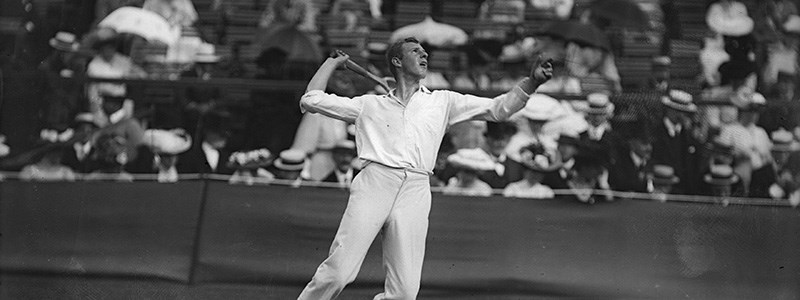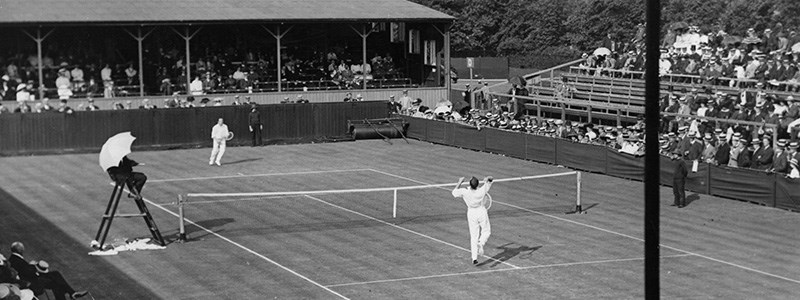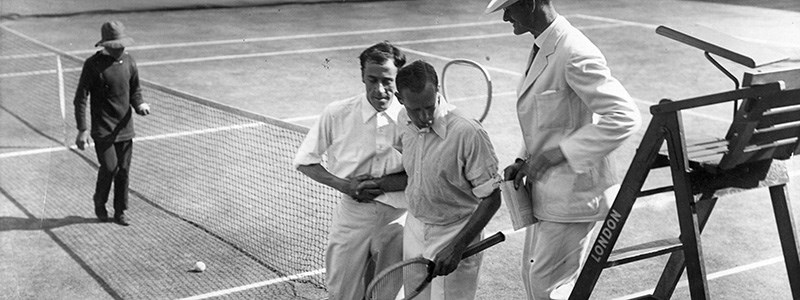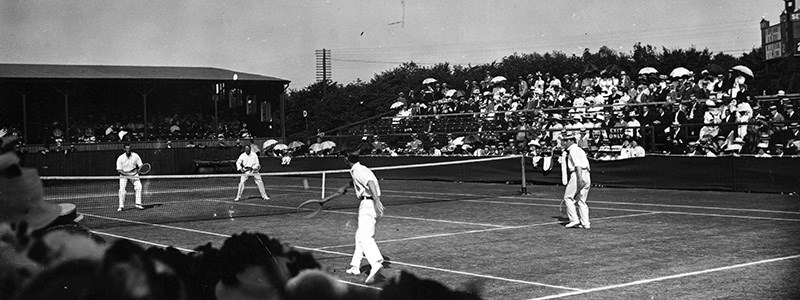
History Makers: Anthony Wilding
• 6 MINUTE READ
Tennis has a long history of great champions – from Perry to Murray, from Roger to Rafa – but there is always one who paves the way for future generations to come.
A multiple Grand Slam champion, tennis’ first recognised superstar and a war hero – introducing, Anthony Wilding.
New Zealand born tennis star, Wilding, was one of the greatest talents of his era – winning eight singles and doubles Wimbledon titles (including four consecutive singles championships), three combined Australasian Championships (now known as the Australian Open), two World Hard Court Championships, one World Covered Court Championships, four Davis Cups and an Olympic bronze medal, between 1906 and 1914. That's quite the resume!
To this day he still holds the record for the most titles won in a single season back in 1906, when he claimed an incredible 23 trophies in one year.
Regarded as the biggest star in the game at the time and the first player to become a true icon in the sport – Wilding’s career was tragically cut short after he died serving in World War I.
This Remembrance Day, we take a look back at the life and career of one of tennis’ most courageous and inspiring heroes.
From New Zealand to England
Wilding’s parents grew up in Herefordshire but after they got married, decided to emigrate to New Zealand to start their family.
As the second of five children, Wilding took after his dad, Frederick Wilding, as a keen sportsman. Anthony was a talented young cricket and tennis player, whilst Frederick had a gift for tennis himself, winning several doubles titles in New Zealand.

Wilding first picked up a racket at the age of six and played all throughout his childhood, leading up to a seven-week journey to Britain to attend Cambridge University. He wanted to follow in his dad’s footsteps and study to become a lawyer, but his passion for tennis stayed strong.
He joined the university team and by his second year became the secretary, helping make tennis one of the most popular sports on campus.
But in 1904, his life changed forever. Wilding was invited to compete at Wimbledon for the first time in his career and took the chance, beating Albert Prebble in his first-round debut but eventually losing in the second – the beginning of a relationship that would last for many years to come.
In many ways Wilding was ahead of his time. Like the modern players today, he was renowned for his attacking flair from the baseline, a style which took him to gain his first title later that year in Shropshire.
Tennis’ first global superstar
With the first senior trophy in the bag – Wilding’s rise to the top was unlike anything that had come before
In 1905 he made his Davis Cup debut for Australasia, taking them to the final before losing to the USA, and also picked up his first title on European soil in Germany.

He only had to wait another year to get his first taste of Grand Slam success. After a long season, which saw him reach the semi-finals at Wimbledon and even playing doubles with his dad around Europe, Wilding headed back to New Zealand for the Australasian Championships.
After spending a few weeks on the boat travelling over, Wilding came back with both the singles and doubles titles to claim two of his three career slam titles on home soil.
Achievements
- 4x Wimbledon singles titles (1910, 1911, 1912, 1913)
- 4x Wilmbledon doubles titles (1907, 1908, 1910, 1914)
- 2x Australasian Championships singles titles (1906, 1909)
- 1x Australasian Championships doubles titles (1906)
- 2x World Hard Court Championships singles titles (1913, 1914)
- 1x World Covered Court Championships singles titles (1913)
- 1x Triple World Champion (1913)
- 4x Davis Cup winner (1907, 1908, 1909, 1914)
- 23 tournaments won in a single season (record)
- 1x Olympic Bronze medal (1912)
Fast forward 12 months and Wilding had won his first of three consecutive Davis Cup titles with Australasia defeating the Brits in the final at Wimbledon, as well as his first doubles title at the Championships, teaming up with Australian, Norman Brookes. He defended the title a year later with well-loved British star, Major Ritchie.
In 1909, not only did he win his second Australasian Championships singles title, but he also qualified as a Barrister – talk about talented! But with the Wimbledon title still missing from his achievements he decided to concentrate on his tennis.
They say good things come to those who wait – and so it did for Wilding. The next year, he started his journey to a historic run at SW19, which saw him win four singles titles in a row. In his first final he defeated the legendary Arthur Gore, 6–4, 7–5, 4–6, 6–2.
Wilding was the only player to win four consecutive Wimbledon trophies until Bjorn Borg in 1979.
He won his last Wimbledon title in 1913 – a year before the war – the same year that he completed one of his greatest career achievements, the World Championship triple. He was the champion at the World Hard Court Championships in Paris, Wimbledon and the World Covered Court Championships in Stockholm.

A hero in every sense
When World War I broke out in 1914, Wilding enlisted in the Royal Marines. Rumour has it that this was on the advice of Winston Churchill, who was then First Lord of the Admiralty.
However, it was only a few days before he was then attached to Intelligence Corps, where he joined the Royal Naval Armoured Car Division because of his detailed knowledge of the European roads and driving skill. As well as a brilliant tennis pro and barrister, Wilding was also an excellent driver and competed in motorsports across Europe. There wasn’t much he couldn’t do…
For really the first time in seven and a half months I have a job on hand which is likely to end in gun. I, and the whole outfit being blown to hell
After a week’s leave back in London in 1915, Wilding headed to France to serve under the command of the Duke of Westminster. With his squadron being moved closer to the firing line and given Wilding’s new title of Captain, it was only a matter of time before he was called to action.
In a letter dated around this time, Wilding said: "For really the first time in seven and a half months I have a job on hand which is likely to end in gun. I, and the whole outfit being blown to hell. However, if we succeed, we will help our infantry no end."
Only a day after this letter was dated, Wilding was killed in action at the Battle of Aubers Ridge in Neuve-Chapelle. He died aged 31.
On Remembrance Day we want to take time to recognise Wilding, a man with the world at his sporting feet and the first global superstar of the game; for his service to protect others that will never be forgotten.
We take time this year to reflect on the bravery and sacrifice of Wilding and the hundreds of thousands of others who tragically gave their lives during the war.
We will remember them.





